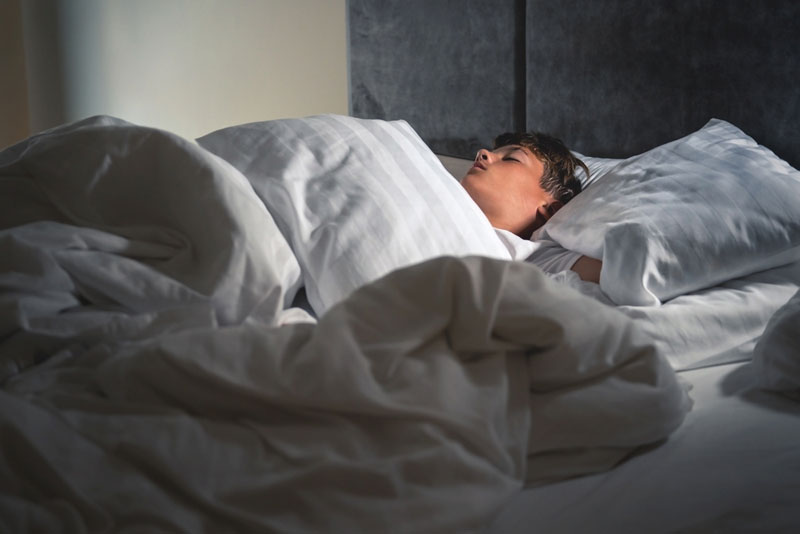Sleeping in a cold room has been a topic of interest and research in the sleep science community for years. With the quest for better sleep quality becoming more prominent in today’s fast-paced world, understanding the impact of room temperature on sleep is more relevant than ever. This blog explores the benefits and potential drawbacks of sleeping in a cold room, helping you decide whether turning down the thermostat could be the key to unlocking the best sleep of your life.
Benefits Of Sleeping In A Cold Room
Getting a good night’s sleep is crucial to waking up feeling fresh and energized. Let’s explore the advantages of sleeping in a cooler environment, revealing a spectrum of benefits beyond the immediate perks of improved sleep quality and faster sleep onset.
1. Improved Sleep Quality

The body’s core temperature naturally drops as we prepare to sleep, signaling the brain that it’s time to rest. Sleeping in a cooler environment (around 60-67°F or 15-19°C) can facilitate this drop in temperature, leading to deeper, more restorative sleep. Cooler temperatures and good sleep posture support the body’s natural thermoregulation processes, enhancing sleep quality and making it easier to fall asleep.
2. Faster Sleep Onset

Having difficulty falling asleep can be frustrating and result in a cycle of sleeplessness and anxiety. A colder bedroom with red light can help you fall asleep faster by aligning with your body’s natural inclination to cool down before sleep, reducing the time spent tossing and turning.
3. Reduced Risk of Metabolic Diseases

Emerging research suggests sleeping in cooler temperatures might have metabolic benefits, including improved insulin sensitivity. This is significant because better insulin sensitivity can reduce the risk of type 2 diabetes and other metabolic disorders. Though more research is needed, these findings open up intriguing possibilities for the role of sleep temperature in overall health.
4. Enhanced Melatonin Production

Melatonin, often called the “sleep hormone,” is critical in your sleep-wake cycle. Cooler sleeping conditions can boost melatonin production, which helps with sleep onset and quality and has anti-aging and antioxidant benefits.
5. Better Caloric Burn

Evidence suggests that sleeping in a cooler room can increase brown fat activity. Unlike white fat, which stores calories, brown fat burns energy and helps regulate body temperature. This increased activity can lead to slightly increased calories burned during the night.
6. Stress Reduction

Sleeping in a cooler room can promote deeper, more restorative sleep and reduce stress. If that doesn’t work, try meditation for sleep and anxiety. Better sleep quality helps regulate cortisol, the body’s primary stress hormone, ensuring that it follows a normal circadian rhythm. Lower stress levels improve mood, concentration, and overall mental well-being.
7. Boost in Mood and Cognitive Function

Deep REM sleep, more easily achieved in a cooler environment, is crucial in cognitive processes and emotional regulation. This stage of sleep aids in memory consolidation, problem-solving skills, and the processing of emotions, leading to better mood stability and cognitive performance during waking hours.
8. Supports Weight Management

Beyond the increased caloric burn associated with cooler sleep environments, quality sleep is a cornerstone of effective weight management, just like probiotics help with weight loss. Adequate sleep helps balance the hormones that control appetite, ghrelin, and leptin, reducing cravings and overeating during the day.
9. Better Skin And Hair Health

The benefits of cooler sleep also extend to your skin and hair health. Enhanced sleep quality supports the repairing and regenerating of skin cells and hair follicles. Cooler sleeping conditions can also help regulate sebum production, reducing the likelihood of acne and giving your skin a healthier appearance.
Medella Springs Sleep Supplement
Incorporating Medella Springs natural ingredients into your routine has been shown to significantly enhance sleep quality, making it easier to not only fall asleep but also stay asleep throughout the night. For those occasional times when you awaken, these natural aids can help you drift back to sleep more swiftly, ensuring that your sleep cycle is less disrupted. Moreover, one of the greatest benefits of turning to natural sleep enhancers is the ability to wake up feeling refreshed and clear-headed without the grogginess often associated with over-the-counter sleep medications. Noctoplex supplements work harmoniously with your body’s natural rhythms, promoting restful sleep that leaves you rejuvenated and ready to tackle the day ahead.
Cons Of Sleeping In A Cold Room
While the benefits are compelling, it’s also important to consider the potential drawbacks of sleeping in a cold room.
1. Difficulty Falling Asleep for Some
For individuals struggling with cold sensitivity, a chilly bedroom might make it harder to fall asleep and find the best sleep direction. Comfort is subjective, and for some, the sensation of being cold is more disruptive to sleep onset than beneficial.
2. Increased Need for Midnight Bathroom Trips
A cooler body temperature can lead to decreased vasopressin production, a hormone that regulates your body’s water balance. This might result in more frequent awakenings during the night to use the bathroom, disrupting sleep quality.
3. Joint or Muscle Discomfort
People with certain conditions, such as arthritis or muscular disorders, may find cold exacerbating their discomfort or pain. A warmer sleeping environment might provide more relief and better support for restful sleep for these individuals.
4. Risk of Getting Too Cold
There’s a fine line between a cool sleeping environment and one that’s uncomfortably cold. Extremely low temperatures can decrease your core body temperature, which, in severe cases, can be dangerous and lead to hypothermia.
5. Increased Heating Costs
On your climate, maintaining a cooler bedroom, especially during the colder months, requires more energy and increases heating costs. It’s important to balance the desire for a cool sleeping environment with practical energy use and cost considerations.
Practical Tips For Sleeping In A Cold Room
- Use breathable, moisture-wicking bedding to maintain a comfortable sleeping environment.
- Wear warm socks or a hot water bottle to keep your feet warm, which can help regulate body temperature.
- Ensure your room is well-ventilated to prevent stuffiness and maintain air quality.
- Gradually decrease the room temperature each night to find optimal sleeping conditions without making drastic changes that might disrupt your sleep pattern.
Conclusion
Sleeping in a cold room can offer several health and sleep quality benefits, from faster sleep onset to potentially reducing the risk of certain metabolic diseases. However, it’s essential to consider personal comfort and health conditions that make a cooler sleeping environment less ideal. Adjusting to your sleeping environment and finding your optimal sleep temperature can improve your sleep quality and overall well-being.

